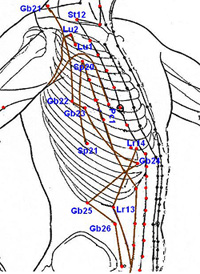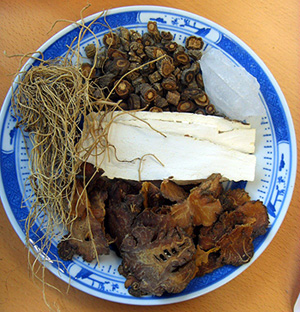Medically, excessive underarm sweating (axillary hyperhidrosis) involves constant heavy sweating in the armpits without any apparent cause. The exact cause of excessive underarm sweating is not known, and specialists believe it may due to increased sensitivity of the sweat glands to neural stimulation. This is a hereditary condition. Other reasons for this condition include specific foods, anxiety, stress, and emotional stimuli. Excessive sweating may appear in the armpits alone or be accompanied by sweaty palms, soles, face and scalp. This kind of sweating often leads to an uncomfortable feeling as well as bad odor and stained clothes.
Treatment options for excessive underarm sweating include antiperspirants, Botox, oral medication and surgery. Since there are different grades of severity, and different people will react differently to the same method, it is better to consult a prefessional to help find the best method that works for you. Nevertheless, one should always start with conservative measures in controlling extreme sweating.
Antiperspirants are considered the first line of treatment for excessive underarm sweating. It is more appropriate to select a product containing 10-25% aluminium based compounds, and try perfume-free ones to reduce the chance of skin irritation. Everyday, apply to dry armpits at bedtime and wash off after 6-8 hours, when the sweating becomes controlled, then apply it one or two times weekly to maintain the control.
The armpits are the most common place to develop body odor, others are the groin, nipples and the navel. Sweat is in fact odorless; it is the bacteria that normally live on the skin that break it down and release chemicals that cause sweat to give off an unpleasant smell. The armpits provide a warm and moist environment for bacteria to thrive, and the sweat glands in this region produce extra proteins and oily substances to feed them. People with excessive sweating in the armpits also tend to have excessive ear wax.
 |
| Meridians run in the underarms and lower chest. |
Herbal prescriptions for excessive underarm sweating
In traditional Chinese medicine (TCM), excessive underarm sweating is a sign of heat accumulation and is related to the liver and heart meridians. The heat may be a product of poor diet, overwork, lack of sleep, or organ weakness. When the accumulated heat affects the liver or heart meridians, it can be transmitted to the armpit regions, which then sweat profusely. TCM treatment principle for the problem is to clear heat from the appropriate meridian and organ, and to resume the internal harmony. Typical disharmony patterns for excessive underarm sweating are below.
Liver deficiency and heat accumulation
Excessive underarm sweating which is worse at night; other associated symptoms include insomnia, dream-disturbed sleep, dizziness, general weakness, paleness, hot flashes, mouth dryness, red tongue and a thready, rapid pulse. The remedy should nourish yin, soothe the liver and clear heat.
Sample prescription: Linking Decoction plus anemarrhena rhizome, amur corktree bark, oyster shell (calcined) and ephedra root.
Heat accumulated in heart meridian
Heavy underarm sweating, other associated signs include irritability, thirst, burning urination, and red tongue which may have sores. The remedy should eliminate the heat through urination.
Sample prescription: Guide Out the Red Powder
When an emotional stimulus triggers sweating, a heart deficiency should be considered, ginseng, dwarf lily-turf tuber and schisandra can be used to nourish the heart and arrest sweating.
Herbal prescriptions for sweaty and smelly underarms
In TCM understanding, body odor has a constitutional character which is hereditary. However, for those who become really smelly, their bodies are usually in disharmony making the body surface susceptible to damp-heat pathogens. Furthermore, the liver and gallbladder meridians, which start at the toes and run bilaterally upward to the head, promote the distribution of damp-heat pathogens and cause some regions of the body to have a stronger odor than others. Techniques for TCM physicians to treat body odor include harmonizing the internal body, controlling the sweating process, clearing the skin and using aromatic herbs to mask the odor. Two commonly seen disharmony patterns are:
Damp-heat irritation
Smelly sweat with or without a yellowish color is often accompanied by irritability, a feeling of incomplete emptying after bowel movements, itchiness, thirst, a red tongue covered by yellow fur, and a floating or rolling pulse. The remedy should clear heat, dry the body, nourish blood and unblock the meridian.
Sample prescription: Wormwood Decoction plus astragalus root, white peony root, cassia twig and vinegar.
Yin Deficiency leading to internal heat
Excessive sweating, smelly armpits, irritability, warm palms and soles, mouth dryness, insomnia, constipation, a red tongue, and a thready, rapid pulse. The remedy should nourish yin, clear heat and arrest sweating.
Sample prescription: Rehmannia Root & Dwarf Lily-turf Tuber Drink
External Remedies to help arrest underarm sweating and eliminate body odor
Besides oral treatments for sweating and its accompanying odor, TCM physicians will also use external remedies such as powders and dressings. The aim of these remedies is to keep the armpits clean and dry, and to inhibit the spread of bacteria.
1. Prescriptions for Washing
 |
Schizonepeta herb (30g), agastache (30g), clove (15g), golden thread rhizome (15g), processed alum (20g) and wormwood herb (30g). |
 |
Chinese nardostachyos root (10g), Dahurian angelica root (12g) and fortune eupatorium herb (6g). |
 |
Acorus (15g), clove (6g) and processed alum (10g). |
 |
Kudzu root or purslane herb (200g) and processed alum (25g). |
When preparing the decoctions, soak the herbs for 20 minutes first and then boil for 30 minutes. Use the solution for washing the armpits, genitals, nipples and navel or for rubbing the body. After washing, rinse with clean water and wipe properly, and dust with absorbent powder if necessary.
Regular exfoliation helps get rid of the sebum and dead skin remnants in the armpits, as these harbor bacteria. You can use a piece of ginger to scrub the area or you can make a regular skin scrub with the above washing prescriptions.
2. Prescriptions for absorbent
- Oyster shell (60g, calcined), fossil bone (60g, calcined) and processed alum (120g).
- Oyster shell (20g, calcined), ephedra root (20g), fossil bone (15g, calcined) and red halloysite (15g).
- Ledebouriella root (30g), Dahurian Angelica root (30g), Chinese wildginger (15g) and Sichuan lovage (15g) and processed alum (30g).
 |
| Ledebouriella root, Dahurian Angelica root,
Chinese wildginger and Sichuan lovage and alum. |
- Processed lead (30g), borneol crystal (6g), alum (30g) and gallnet of Chinese sumac (20g).
Pound the ingredients until they are reduced to a fine powder and put aside. Shave the armpit hair to prepare for applying the powder. Clean and dry the armpits, dust on the powder and rub in. Do this 2-3 times a day.
It should be noted that some external remedies especially folk remedies, may contain a high amount of irritating ingredients. They may cause undesirable reactions, so be cautious and seek professional advice before using them.
Dietary advice for sweaty and smelly underarms
Certain foods contain chemicals that can stimulate sweating and make the sweat smelly, such as curry, garlic, onion and other strong spices. Generally, pungent, spicy and fried foods should be taken in moderation, and salty and preserved seafood should also be avoided. Foods like bitter melon, pear, wax gourd, mung bean, bean crud, rice bean, coix seed, eels, lotus leaf, water chestnut, olive and radish are beneficial, as they promote the elimination of accumulated pathogens through urination. Below are simple recipes that help control sweating and unpleasant odor.
 |
Prepare olives (500g) and fresh radish (500g), boil with 1500ml of water for 30 minutes; serve as a tea and drink regularly. |
 |
Prepare wax gourd (500g, chopped and don't peel), coix seed (500g), boil with 2000ml of water for one hour; add salt to taste and serve as soup. |
 |
Prepare wax gourd (750g, chopped and don't peel), a piece of fresh lotus leaf, boil with 2500ml of water for one hour; serve as tea and drink regularly. |
 |
Prepare water chestnut (10-15 pieces), rice bean (60g) and wax gourd (500g, peeled and chopped), boil with 2500ml of water for one hour; add salt to taste and serve as a soup. |
 |
Prepare chrysanthemum (10g), mulberry leaf (10g) and liquorice root (3g), boil with 750ml of water for 20 minutes; serve as a tea. |
 |
Prepare fresh corn silk (50g) and Asian pond loach (250g, also called mudfish). Clean the loach and remove the organs. Add vegetable oil in a pot and heat, insert the loach and fry slightly; pour in 1500ml water, put in the corn silk, add ginger, green onion and pepper to taste; bring to the boil and allow the ingredients to remain at a brisk simmer until the soup turns silky white. Eat the loach meat and drink the soup. |
Suddenly sweating much more than usual or a change in body odor could be a sign of an underlying health problem such as diabetes or kidney failure. It may be a good idea to pay a visit to your health practitioner for a medical checkup. |